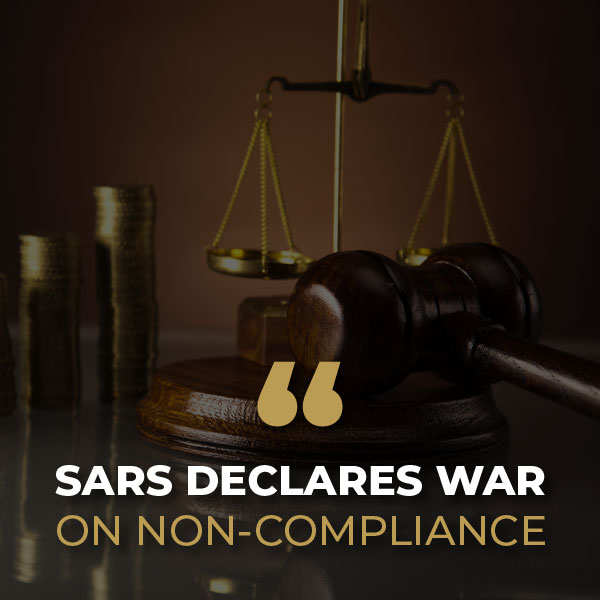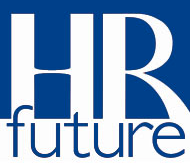SARS DECLARES WAR ON NON-COMPLIANCE
SARS Commissioner, Edward Kieswetter, has used the South African Institute of Tax Professionals’ Tax Indaba as a platform to fire a shot across the bow, letting taxpayers know that non-compliance will be met with the full force of the National Prosecuting Authority (NPA). The Commissioner has allied himself with the NPA and concluded a new accord in terms of which it seeks the prosecution of a long and growing list of at least 1177 non-compliant taxpayers.
Desperate and dangerous
Taxpayers must take this statement very seriously. It must be understood that, at the moment, SARS is fighting a war on all fronts – on the account of the Commissioner himself, it is facing an internal battle to clean up the devastation left by the previous tenures, whilst, at the same time, trying to make good on a massive budget deficit and hoping to eradicate a widespread slippage in taxpayer morality. Times are desperate and SARS has no choice but to proceed on a no-tolerance basis.
Enforcement is key
At the height of its potency, when SARS was one of the most revered revenue authorities across the globe, it operated on three legs, a model developed in SARS’ early years of existence by the then Commissioner for SARS, Pravin Gordhan. One of these indispensable legs was enforcement, which, seemingly, Mr Kieswetter is intent on reviving.
The Commissioner’s approach is encouraging, as we agree that a compliant tax base is very much key in SARS’ renaissance and the fear of criminal prosecution is certainly an effective mechanism in getting compliance back to where it should be.
SARS’ war chest
For those who may still want to take their chances, it is perhaps important to be alive to the fact that the infrastructure and machinery to effectively prosecute taxpayers are already in place, albeit, in recent times, we have not seen it being used as often as it should be. However, when SARS chooses to wield its arsenal, it can be devastating.
Those who believe that criminal prosecution is reserved for taxpayers who are involved with high-end tax evasion or the elicit tobacco trade should revisit their convictions. The Tax Administration Act No. 28 of 2011 (TAA) criminalises a wide array of acts of non-compliance, ranging from seemingly “petty” transgressions such as the failure to file a return or to retain documents, to more serious acts of tax evasion. Taxpayers must also be cognisant that where they are to any degree implicit in the non-compliance of another taxpayer, they may also face criminal prosecution. This includes failure to withhold PAYE or instances where a person is involved in a company’s non-compliance.
The TAA does not spare negligent or lax taxpayer’s either, as intent is not always a requirement to fall foul of the criminal offences list. For example, a person may have started a company and simply never bothered with its compliance, in which case he or she may be prosecuted under the TAA, as well as the Companies Act No. 71 of 2008. A taxpayer’s ignorance can easily result in the NPA, at the behest of SARS, knocking at their door.
Do not tempt fate – it is not too late
The good news is that SARS encourages taxpayers to confess their sins and the TAA makes express provision for such instances in the form of the Voluntary Disclosure Programme (VDP). The VDP gives amnesty from criminal prosecution, in addition to substantial relief from penalties. Taxpayers would do well to heed the Commissioner’s warning shot; do not be the one in the orange uniform who galvanises compliance in others. The key here is “first mover advantage”, as you are legally prohibited from claiming VDP where a tax audit has commenced.
What we would not like to see
The last time SARS started an initiative similar to this, it pursued the softest of targets, such as a celebrity soap star who did not submit a tax return and a small trader in Port Shepstone who failed to submit his VAT returns. A couple of admission of guilt fines later, and SARS claimed bragging rights. Whilst everyone should be treated as equal before the law, this probably did not have tax fraudsters quaking in their boots; likely quite the opposite.
Prosecuting with courage
If SARS wants the tax base to know that it means business this time, it should consider the following –
- To date, taxpayers have seen little bang for their buck from the various Commissions of Enquiry. The corrupt do not have the proclivity to pay tax on money in brown envelopes, so we hope, for a change, they will be high on SARS’ hit list.
- The whole of South Africa wonders how we could have such massive budget deficit if the Guptas paid their Capital Gains Tax exit charges under section 9H of the Income Tax Act when they emigrated. If they have not paid their dues upon their departure, their names should be first on the list.
- The ex-KPMG partner Jacques Wessels pleaded guilty and was subsequently struck off the roll of auditors by IRBA for six charges of misconduct that, according to IRBA, resulted in a loss to SARS of more than R2 million in tax revenue. Patently, there is a prima facie case of tax evasion that needs answering and it is perhaps possible that other parties were also complicit in assisting the Gupta-linked firms to perpetrate this offence. Thus far there is no indication that SARS is doing its own investigation into this matter. SARS should set the record straight that it prosecutes tax evasion, with no one spared.
- SARS should consider prosecuting a person from each segment of society; perhaps at least one politician, a professional business person who made a living from VAT collected and not paid to SARS, persons who illegally used offshore trusts and other structures to evade taxes, taxpayers who falsified expenses, a payroll practitioner who helped operating an illegal payroll, etc. When it comes to simple prosecutions like someone who did not do their tax returns, pick someone who will send a message, such as a partner in a law or accounting firm or director of a listed company.
- A special place must be reserved in prison for the tax practitioners who devise these fraudulent schemes to “help” taxpayers in getting away with illegal claims – some of these names must be on the prosecution list, to ensure the deterrence factor reverberates across the tax base.













